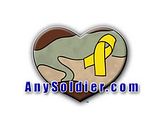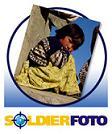“I Want Every Human to Live in Peace.”
So do I Mr. Hussein, so do I. Maybe, if more of us can be like you and Sergeant D, it can happen. From the United States Central Command site, comes this inpiring story of how an Iraqi fire fighter wants only the best for his country and how one soldier has made a difference in how America is perceived. The two men see each other as fellow human beings. Isn't that how it should be?
“I Want Every Human to Live in Peace.”
By Tom Clarkson
Gulf Region Division
U.S. Army Corps of Engineers
With that one short, simple utterance, Abas Jasam Hussein, a 31 year old, unmarried, Iraqi fire fighter addressed his concerns for his country and hopes for its future. Though he spoke in a language other than his own, one could tell that he had thought long and hard on the subject.
The eight year veteran of the Baghdad fire fighting team has seen dramatic change during that time. Prior to Iraqi Freedom, if there were twenty individuals in his fire station, at any time during the day, that was a lot. Today, regularly, there are 120. Often he could not respond to a fire as there simply were not enough personnel or equipment to fight more then one at a time.
“I Want Every Human to Live in Peace.”
By Tom Clarkson
Gulf Region Division
U.S. Army Corps of Engineers
With that one short, simple utterance, Abas Jasam Hussein, a 31 year old, unmarried, Iraqi fire fighter addressed his concerns for his country and hopes for its future. Though he spoke in a language other than his own, one could tell that he had thought long and hard on the subject.
The eight year veteran of the Baghdad fire fighting team has seen dramatic change during that time. Prior to Iraqi Freedom, if there were twenty individuals in his fire station, at any time during the day, that was a lot. Today, regularly, there are 120. Often he could not respond to a fire as there simply were not enough personnel or equipment to fight more then one at a time.
And pay? With an almost embarrassed smile he responds, “Under Saddam we made $3 to $4 a month and received a special inducement pay of an additional 20 cents for each fire we went to.” Today he earns $400 a month.
Clearly proud of the change he states, “Since the war I have received training in Germany and Jordan and we have received many new pieces of equipment. We now have new or modernized fire stations through the U.S. Army Corps of Engineers and the Project and Contracting Office. And Japan has donated 70 fire trucks and a number “command” vehicles.”
Much of the life saving equipment - such as the “Jaws of Life” and other hydraulic equipment to help get trapped persons out of wrecked cars - is new technology for the Iraqis. It is with this equipment that he regularly assists SSG Michael DiDonato to train firemen in a large, open field in the International Zone.
He beams when speaking of “Sergeant Di”, a member of the recently established Provisional Reconstruction Team, who stands nearby. Of his burly buddy and mentor he says, “We are learning much from “the father of the Baghdad Fire Department.” There is a great deal of truth to that fact. A New Jersey native, DiDonato has been here training Iraqi firemen since September of 2004 and is beloved by virtually all with whom he has so closely worked.
Hussein turns to him saying, “We need you to stay here and help rebuild Iraq. Not like your Manhattan.” He pauses thinking and with readily apparent sincerity finishes his thought saying, “but to make it at least better. I see (the U.S.) as very, very, very good – like a father.” With much sincerity he states with conviction, “I see the mercy inside the heart of the United States.”
Ask his thoughts regarding the US media claims of a civil war raging in his country and how he feels when he goes out to a fire. He answers plainly, “I feel very safe to come to work.” He acknowledges that occasionally fire fighters have been targeted by insurgents and, frowning in disgust says, “Firemen are for all humans in Iraq. We are not fighters.”
Addressing the significant differences between Kurds, Shiites, and Sunnis he speaks as a true professional. When trying to save endangered individuals, “I see only the human.” If but the rest of the world could only think, feel and act the same.

































<< Home